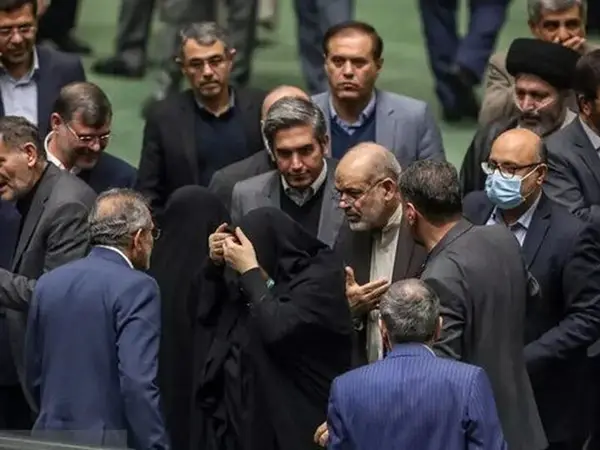Under immense pressure by more than 200 lawmakers, Interior Minister Ahmad Vahidi promised this week to fire his political deputy Mohammad-Reza Gholamreza.
Deputy Interior Minister for Political affairs who also chairs the ministry’s Election Supervisory Board for the upcoming parliamentary election in March, had issued a statement to bar lawmakers from intervening in executive affairs in their constituencies.
The ministry's concern was mainly about interference with the election process by lawmakers who wish to be re-elected. Apart from the conflict of interest issue, another concern was undermining the prerogative of the executive branch.
More than 200 lawmakers tabled a motion Monday night to impeach the interior minister. This was a vehement threat, as calls for impeachment are usually signed by between 20 to 40 lawmakers. Vahidi was caught in a situation no minister would want to be in, particularly as Tuesday morning government ministers and President Ebrahim Raisi were going to the Majles to defend the nomination of a new agriculture minister.
The social media rumor mill pointed out early in the morning that the President and the Interior Minister will have to step back, otherwise the lawmakers will impeach the interior minister and will not give their vote of confidence to the new agriculture minister. This was probably what played out in the corridors of power in Iran: Another tempest in the teacup as the man in the street cannot care less about a government that has messed up the economy and a parliament that cannot hold the government to answer.
The Interior minister overruled his deputy's order practically allowing lawmakers to interfere in the hiring and firing of local government officials in order to control the election process. But the lawmakers were still not happy. They demanded the removal of the deputy interior minister. They further threatened that they will go ahead with the interior minister's impeachment if his deputy was not removed from his post until Saturday, the beginning day of new week in Iran.
According to reformist daily Shargh, some lawmakers such as Shahryar Haidari said that the statement issued by the deputy interior minister was an insult to lawmakers. Others also made equally angry remarks partly to show their clout to potential voters in the next election. They also demanded an apology from the Raisi administration.
Others accused the interior ministry of undermining Supreme Leader Ali Khamenei's order for cooperation between the Majles and the government. Nothing in Iranian political circles can be as damning as accusing someone of disobeying Khamenei.
Etemad Online and other news sources in Iran pointed out that Vahidi's arrival at the Majles Tuesday morning caused an uproar among more than 200 of Iran's 290 lawmakers. Interestingly, they said they wanted to impeach Vahidi for his poor performance during the 2022 protests. Another interesting point was that although the Majles presidium usually objected to calls for impeachment, they were supportive of the angry lawmakers.
After a closed-door session, Vahidi promised to fire his deputy, but this does not necessarily mean that Gholamreza will be dismissed. He is an IRGC general and enjoys support within the ranks of the corps. On the other hand, as far as the government is concerned, the MPs should not be emboldened beyond what they have achieved.
By midday, the crisis appeared to be over. The lawmakers who have always been accused of being intimidated by the government shouted at Vahidi and restored their credibility in the eyes of their constituents. The government was happy to have won the lawmakers' vote of confidence for a new agriculture minister and Vahidi barely saved his pride by postponing his deputy's removal to a future date that may not happen.
In the Iranian political circus, everyone is a winner until Khamenei's next speech when he chooses who is going to enjoy his support and who is going to be faced down.
